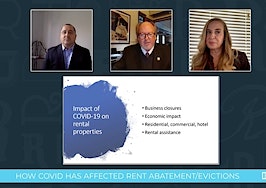Despite the Center for Disease Control’s (CDC) current nationwide ban on evictions through the end of December, expiring eviction bans at the state level over the course of the coronavirus pandemic have led to hundreds of thousands of additional COVID-19 cases, according to new research reported by CNBC on Friday.
The study — a collaborative effort by researchers from the University of California, Los Angeles; University of California, San Francisco; Johns Hopkins University; Boston University; and Wake Forest University School of Law — found that some 433,700 COVID-19 cases and 10,700 deaths were caused by expiring state bans and allowing evictions to be carried out between March and September.
In order to determine the correlation between continuing evictions in a state and its coronavirus cases, the study’s researchers took into account stay-at-home orders, mask orders, school closures, testing rates and other factors. However, it should be noted that the study took place prior to a nationwide surge in COVID-19 cases that began around the beginning of November, suggesting that these numbers may now be even higher.
“When people are evicted, they often move in with friends and family, and that increases your number of contacts,” Kathryn Leifheit, a postdoctoral fellow at the UCLA Fielding School of Public Health and one of the study’s authors, told CNBC. “If people have to enter a homeless shelter, these are indoor places that can be quite crowded.”
To date, over 13.4 million Americans have contracted COVID-19 and over 266,700 have died from the virus. If the CDC’s ban isn’t extended beyond the end of 2020, many wonder how it may negatively impact COVID-19 positivity rates further.
Statewide eviction bans have varied widely from state to state, with some moratoria only lasting about two to three months, while others continue to be in effect since early on in the pandemic. However, despite legal protections in place for renters, the enforcement of evictions bans has not been uniform, and can largely depend on what judge is given the case, and how landlords respond to tenant declarations of hardship.
One single mother living in North Carolina, for instance, recently attempted to submit a CDC declaration form to her landlord stating financial hardship as a result of the pandemic, only to have management refuse to accept the form. In early November, sheriff’s deputies evicted her from her home.












